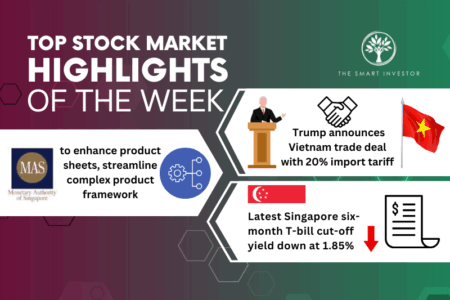I remember when I was a rookie investor back in 2005.
After reading a few investment books on value investing and Warren Buffett, I believed I had sufficient knowledge to dip my toes into the stock market.
As with most beginners, I had limited capital as I was new to the corporate world.
I proceeded to load up on smaller, fast-growing companies such as C&O Pharmaceutical, Sembawang Kimtrans, Global Voice, Olam International Limited (SGX: VC2) and offshore and marine support firm Ezra Holdings.
The prevailing thought I had back then was that these fast-growers could multiply my capital quickly.
A nasty surprise
But what I had conveniently neglected was that such companies were also inherently riskier.
Pharmaceutical distribution companies can be squeezed by larger players while commodity businesses face boom and bust cycles.
Suffice to say it was a hit and miss affair as some companies did well while others flopped.
But growing your wealth doesn’t have to be so tough.
You can always choose to compound your wealth through REITs.
An inflation hedge
First introduced in 2002, REITs own property portfolios that are bundled nicely together in a package and listed on a stock exchange.
The way REITs are structured makes it convenient for investors to buy and sell their units.
Moreover, the requirement to pay out at least 90% of their earnings as distributions means REITs effectively double up as a dependable source of passive income.
REITs are also great as inflation hedges, which is an important factor considering Singapore’s headline inflation rate stood at 4.3% in February, a nine-year high.
The ability to raise their rentals gives REITs the power to ensure their rental income at least keeps pace with, or even exceeds, inflation.
My initial trepidation
Sadly, apart from my initial investment in Suntec REIT (SGX: T82U) back in 2004, I did not more REITs into my portfolio for more than a decade.
Being enamoured with smaller companies, I focused more attention on them early on in my investment journey.
I also had my reservations about REITs as they were loaded with debt, giving me the impression that they were riskier than they seemed.
My initial trepidation meant that I would only start adding more REITs to my portfolio in 2017 when I scooped up units of data centre REIT Keppel DC REIT (SGX: AJBU) and Frasers Logistics & Commercial Trust (SGX: BUOU).
I soon realised that the properties within each REIT provided the collateral for the debt that it was taking up.
And as long as these properties were high-quality and well-located ones, they should continue attracting blue-chip clients that will provide a steady and dependable rental income stream for the REIT.
A compounding vehicle
There were some excellent REITs back in the day.
Parkway Life REIT (SGX: C2PU) was one such example.
Its distribution per unit (DPU) started at S$0.0683 in 2008 but has since more than doubled to S$0.1408 in 2021.
Its unit price has also risen more than four-fold from S$1.13 as of end-2007 to S$4.67.
And here is the primary reason why REITs should form an integral part of your portfolio.
By reinvesting the distributions you receive into the very same REITs that paid them out, you can compound your wealth over time and build up a robust retirement fund.
REITs such as Parkway Life REIT have not only paid out increasing dividends over the years, but their unit price has also risen in tandem.
I’ve since learnt my lesson.
I have continued adding more REITs to my portfolio, with the latest being Digital Core REIT (SGX: DCRU), which was just listed last year.
And if you haven’t already, you should seriously consider adding this excellent asset class to not just enhance your portfolio’s returns but also to grow your stream of passive income.
Not sure which REIT to put your money in? Use our 7-step REIT checklist to find one that fits into your retirement plan. Checklist is inside our latest FREE report “Singapore REITs Retirement Plan”. Click here to download it now.
Follow us on Facebook and Telegram for the latest investing news and analyses!
Disclaimer: Royston Yang owns shares of Suntec REIT, Keppel DC REIT, Frasers Logistics & Commercial Trust and Digital Core REIT.




